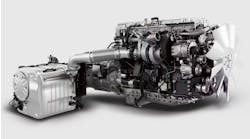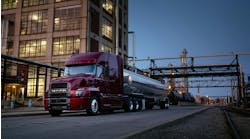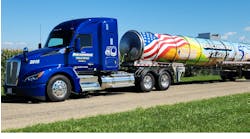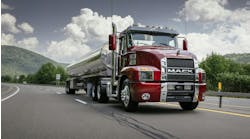ConMet marks 30 years of PreSet hub tech
Peterson celebrates 80 years of innovation
Mack Trucks celebrates 125 years
Class 8 truck orders improve in December
ATTENDEES at a Volvo Trucks North America (VTNA) technology conference in September were given a preview of the company’s battery-electric VNR regional haul truck. The conference took place next to Volvo’s New River truck plant in Virginia, where the truck will be built.
The battery-electric VNR is scheduled for launch in late 2020, but early production units will go to certain California customers as part of Volvo’s LIGHTS (Low Impact Green Heavy Transport Solutions) program. Volvo has partnered with California’s South Coast Air Quality Management District as well as industry leaders in transportation and electrical charging technology.
Brett Pope, VTNA director of electric vehicles, said during the technology conference that the company is looking at a regional rollout of the battery-electric VNR. “In addition to designing and building the truck, we have to make sure the heavy-duty truck charging infrastructure is in place,” Pope said. “That infrastructure simply is not there at this time. It will take six to 14 months to put that infrastructure into place.”
Infrastructure is a critical component of the three-phase program that VTNA has developed as part of the launch process for the battery-electric VNR.
In Phase 1, Volvo will offer battery-electric VNRs with full-service leases that include maintenance, insurance, and uptime services on a monthly scale.
With Phase 2, Volvo will lease support services, including charging stations and installation and setup of those systems.
Phase 3 is being called “Energy as a Service” by Volvo, and this includes providing power at fixed, negotiated rates. Future offerings might include solar power.
During the first year of production, the battery-electric VNR will be offered in tractor and straight truck versions with an initial gross weight capability of 66,000 pounds. The truck will be offered in 4x2, 6x2 with a lift axle, and 6x4.
A tractor with an enhanced electric drivetrain will be added in 2021 with more power, range, and an 80,000-lb gross combination weight rating.
The batteries used in the truck have a target life of eight years, and the chassis is designed for quick changeout of the batteries. Pope said Volvo is researching next-generation batteries that could provide 25% to 30% more life.








